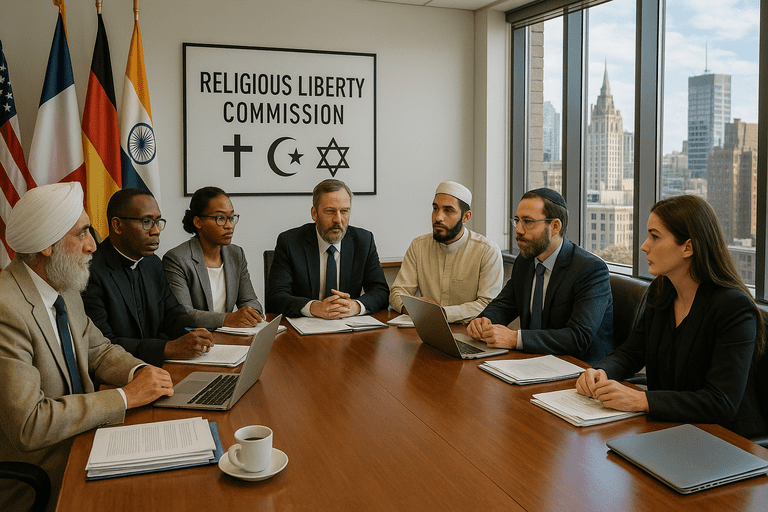On May 1, 2025, President Donald Trump signed an executive order establishing the Religious Liberty Commission. This body is tasked with investigating and promoting policies that protect religious freedom in the United States. The Commission is set to operate until July 4, 2026, unless extended, and aims to report on threats to religious liberty while celebrating America’s religious pluralism. (time.com)
The Commission is chaired by Texas Lieutenant Governor Dan Patrick and includes members such as Dr. Ben Carson, Dr. Phil McGraw, and Pastor Paula White. Critics have noted the predominantly evangelical composition of the Commission and the exclusion of other religious groups. Some members have previously expressed views against Islam, LGBTQ+ rights, and the separation of church and state. (time.com)
In a related development, on April 11, 2025, U.S. District Judge Dabney Friedrich ruled against 27 religious organizations that sought to limit immigration enforcement in places of worship. The plaintiffs, including Christian and Jewish groups such as Mennonite Church USA and the Central Conference of American Rabbis, had sued the Trump administration following the rescission of longstanding policies that protected sensitive locations, including churches, from immigration enforcement. The judge determined they lacked legal standing, asserting their alleged harm was speculative and there was no evidence that places of worship had been specifically targeted. (reuters.com)
The Trump administration’s withdrawal of prior guidance on “sensitive locations” on January 20, 2025, removed formal protections for places like churches and schools. The Department of Homeland Security indicated that individuals could no longer rely on churches to avoid arrest. While this lawsuit was dismissed, a separate case in Maryland, filed by Quaker, Sikh, and Baptist groups, resulted in a judge issuing a preliminary order restricting enforcement at their places of worship. (reuters.com)
These developments highlight the evolving landscape of religious liberty enforcement and public faith conflicts in the United States. The establishment of the Religious Liberty Commission reflects the administration’s commitment to addressing perceived threats to religious freedom. However, the composition of the Commission and its focus have raised concerns about inclusivity and the potential for advancing specific religious agendas.
The legal challenges surrounding immigration enforcement in places of worship underscore the tension between national security policies and religious freedoms. The rescission of the “sensitive locations” policy has led to fears among religious communities about the sanctity of their spaces and their ability to minister to all individuals, regardless of immigration status.
As these policies and legal battles unfold, the balance between enforcing immigration laws and protecting religious freedoms remains a complex and contentious issue. The outcomes of these cases and the actions of the Religious Liberty Commission will likely have lasting implications for the interpretation and application of religious liberty in the United States.
In the meantime, religious organizations and communities are navigating these changes, seeking to uphold their missions while complying with evolving legal frameworks. The interplay between government policies and religious practices continues to shape the discourse on religious liberty and public faith in the nation.
The establishment of the Religious Liberty Commission and the recent legal rulings represent significant developments in the ongoing conversation about the role of religion in public life and the extent of religious freedoms. As these issues progress, continued oversight and dialogue will be essential to address the concerns of all stakeholders involved.
—
Julie Harris covers faith, family, and values-based policy. She holds a journalism degree from Hillsdale College and began her reporting career covering religious liberty cases at the state level. With a strong grounding in moral philosophy and cultural reporting, she brings depth and clarity to complex legislative debates surrounding life and faith.



